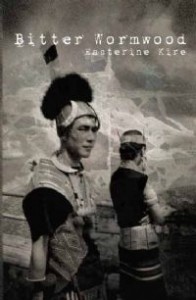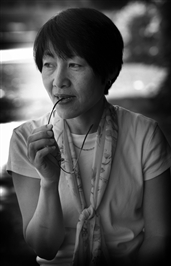Bitter Wormwood: Interview with Author Easterine Kire
by ICORN / January 16, 2012 / No comments
Easterine Kire, who hails from conflict-plagued Nagaland in northeastern India, was ICORN‘s Guest Writer in Tromsø from 2005-2007, where she continues to live and work prolifically. Easterine was gracious enough to answer a few questions about her writing and the struggles of the Naga people to mark the release of her new novel, Bitter Wormwood. Through the scope of one villager’s lifespan, the novel details the series of occupations and violent setbacks that the Naga have experienced in the 20th century.
In this interview Easterine discusses the psychological effects of such occupations, the important (and endangered) art of spoken word, and the power of folklore to preserve peace.
What inspired you to write Bitter Wormwood?
Bitter Wormwood is a novel that spans the years 1937 to 2007 and is about the freedom struggle of the Nagas from Indian occupation 1947. As I stated in the introduction, it is a book about “the ordinary people whose lives were completely overturned by the freedom struggle.” So I could say that it was the stories of the people and their untold suffering that inspired me to write this book.
What specific effects do years of occupation have on a community’s psyche?
First, the community has the shared experience of fear and then that is followed by silence. In the case of the Indian occupation of the Naga Hills, the people experienced genocide, starvation, burning of villages, fields and granaries, and torture. Their culture was devalued and their religious centres, such as churches, were desecrated. Caste was used as an oppressive instrument because the Indian soldiers came from a caste society whereas Nagas were casteless. In subsequent years, occupation led to the problem of surviving Nagas experiencing the psychological effects of self-hatred, alcoholism, depression, and self abuse and domestic abuse. Another psychological effect of the constant oppressive policies is victimhood on a very high level.
What would you like the public to know about Nagaland and the struggles of the Naga people?
I’d like people to know the truth, unadulterated and ugly though it may be at times. Not my version of the truth, but an objective truth that people in their heart of hearts will have to agree with as true, even if it paints an unattractive picture of the conflict and of the people who became its prisoners.
You are an author of the written word, but could you speak about your feelings on the preservation of oral poetry and storytelling? In your opinion, how important is oral literature for the modern world?
I have translated over 200 poems from my native Tenyidie into English. I worked with several oral narrators and learnt much from them of native wisdom and lore and native ways of resolving conflicts. Folk wisdom has been greatly ignored in statesmanship but the culture of inter-village friendships that we have had promoted peace and built strong relationships between villages. This is the kind of knowledge transferred in oral literature. I love how oral narrators use language as a tool of communication: They so naturally and easily use poetic expressions and turns of speech in their everyday language which we users of the written word struggle for days to produce. This kind of familiarity with the spoken word is an art we are losing and could learn to cultivate again. Because it is also a culture that promotes a courteous way of communicating and that always contributes to peaceful communication.
You write about the strong and subtle influence that women have on Naga patriarchal culture in A Terrible Matriarchy. What do you predict for the future status or rights of young women in Nagaland now?
Naga women today have made much progress from what the status quo was fifty years ago. They are very aware of their rights and there are groups that educate women in the villages about these rights. Naga women are increasingly seeking jobs in sectors primarily dominated by men, such as engineering, IT, Law, and the army. They have formed self-help groups and changed village economy.
How do you feel your move to Norway and being in a city of refuge has affected your writing process?
Living in Norway has given me the distance I needed to become an objective writer and thinker. I no longer take sides and I feel that has given me a greatly objective perspective of the situation at home. I think differently now: I am solution oriented instead of problem oriented. I am at the same time moving beyond the narrow confines of being defined by other people and being defined by the conflict because there is much more to me and my people than just another political conflict.
What projects are upcoming for you?
I have released the first children’s book in English in Nagaland in December 2011 with very good response. In 2012, I will work on two more children’s books using different artists. The first with a Norwegian artist on a book set in Nord Norge. For the second book I will be working with an English artist on a children’s book about a wombat.
I will continue working and performing with my Jazzpoesi band.
My agent is working on auctioning my latest book, When the River Sleeps, a novel on the Naga spiritual universe. It is exciting to have all these projects in the pipeline. But the most satisfying part is being able to do collaborative work with young filmmakers, artists, photographers, musicians, and even doll makers on different projects such as book making or poetry performing and storytelling. This gives them an income even as we enjoy working collaboratively with different media and different art forms.
“One may not think that something as simplistic as a folk tale would need to be approached with ritual and ceremony in order that its narration might take place, but it does.”
Easterine is also working on a literary project called Narratives Silenced by War: Naga Folktales and People Stories in order to breathe new life into the literary heritage of the Naga people. She describes how folk tales are often suppressed during unstable times:
Of the many narratives silenced by war, the folk tales of the Nagas suffered a long period of being silenced. This was because folk tales require certain settings in order to be told. The Naga war with India, after military operations began in 1956, destroyed the settings for oral narratives. One may not think that something as simplistic as a folk tale would need to be approached with ritual and ceremony in order that its narration might take place, but it does. The folk tale belongs to eras of relative peace in the village community…
…
In the 1950s and 1960s many Naga families were displaced by the freedom struggle. People in the villages were the worst affected and they abandoned their village homes to hide in rough shelters in the forests. They moved in small groups for fear of detection. The pattern was that two or three families sheltered together and the number of children in some groups were higher than the number of adults. Hiding in rough camps in the forests and frequently moving camp, these families survived on the meager food rations they carried with them. They also took from the forests what food it offered in the form of herbs and berries. In that period the forests of Nagaland were infiltrated by the Indian army so these refugee-families held very little conversation amongst themselves. The children were discouraged from playing or talking loudly. With the ancestral hearths displaced, the folk tale lost its setting and its narrative was silenced throughout the period of displacement during the Indo-Naga war. The peace that is essential to the continuation of oral narrative was uprooted when the grandmother’s hearth in the village-world was destroyed and the villages burnt and its inhabitants tortured and killed or forced into evacuation.
This interview was originally published in January, 2012 for the International Cities of Refuge Network (ICORN), and was conducted by ICORN intern Kate Stricklan.






